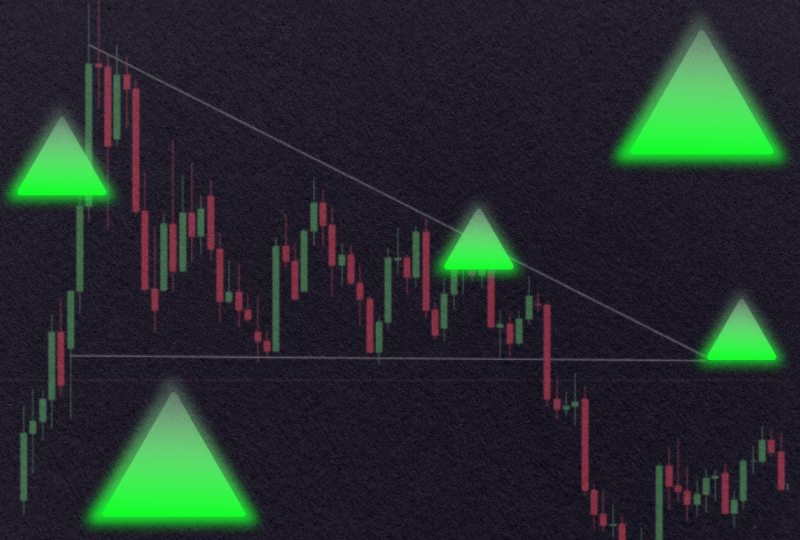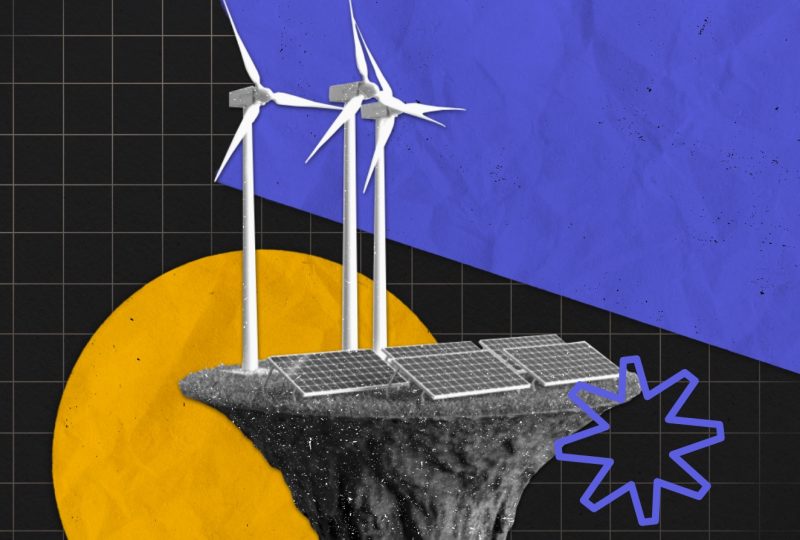Blockchain Social Media Landscape: Is This The Future?
Mar 08, 2024
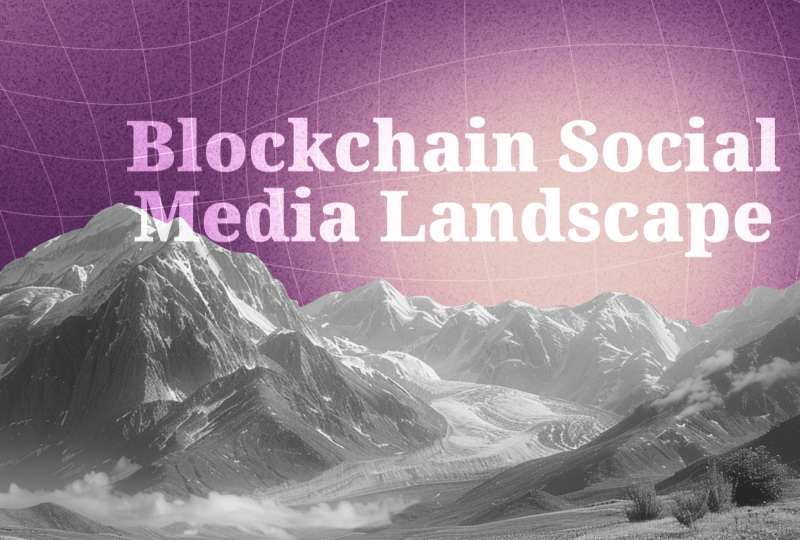
The growing interrelation of social media raises privacy, censorship, and data custody concerns. Decentralized social media venues (DeSo) utilize blockchain technology to provide reliable solutions to these issues and revolutionize the online experience for billions of users.
Unlike established social media services, these networks prioritize user sovereignty and security, putting users first. Blockchain social networks offer a more secure and efficient way to connect and communicate, thereby enhancing the overall digital landscape.
In this article, we will discuss what is decentralized social media, how it differs from centralized ones, the key perks and limitations of DeSo networks, and the most popular decentralized media platforms.
Key Takeaways
- A decentralized social media platform is not governed by a central authority and uses blockchain technology to distribute data.
- DeSo platforms are more secure and less prone to outages, but they still have some drawbacks.
- Sapien, Mirror, and Steemit are some of the most popular DeSo networks.
- Some of the Web2 apps use blockchain technology to integrate Web3 features.
Centralized And Decentralized Social Networks
Centralized social media platforms, like Facebook or Instagram, are based on a centralized architecture. They have a central bureau controlling the network, a central server for data storage, and policies governing content. It can censor or remove content that violates its policies and collect your own data for targeted advertising.
Decentralized social media (DeSo) platforms are online spaces where users can share ideas and stories and meet like-minded people. Such networks use blockchain tech to distribute data and information across a network of users, have no central server, and have no policies governing content. They can also protect user data and privacy.
User data and content are stored securely on a blockchain network run on independent servers. These platforms are permissionless and censorship-resistant, making them popular with free speech advocates.
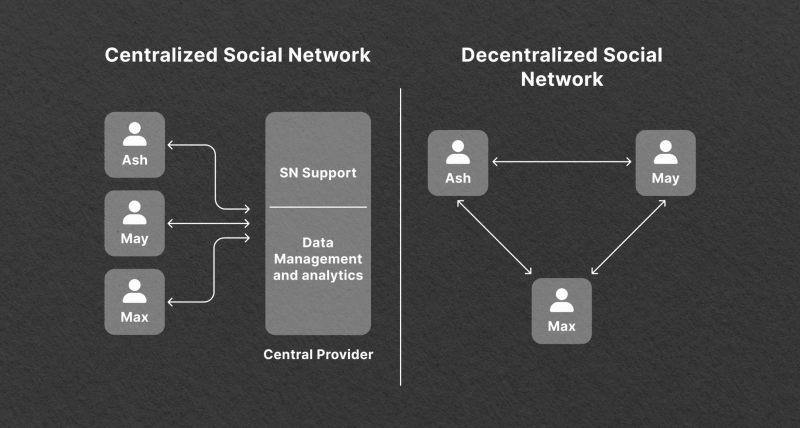
Users can create a DeSo profile using a crypto wallet, shielding user privacy. Decentralized social media platforms are often backed by crypto tokens or non-fungible tokens (NFTs), serving various utilities within the DeSo ecosystem. Some platforms use social media cryptocurrency to monetize by rewarding content creators, while others rely on digital assets to prove account ownership or form DAOs for protocol governance and development.
Traditional social media platforms have been criticized for their opaque decision-making and high vulnerability to data breaches.
Blockchain-based social media networks offer a solution to data security issues faced by traditional platforms. Unlike centralized social media that host user data on centralized servers, DeSo networks distribute information across independent nodes and use cryptography to secure it. Users can also create their own algorithms, allowing them to control their online content rather than being influenced by sponsored content.
Some platforms even incorporate DeFi integrations, allowing users to send tips using digital currencies.
How Blockchain Social Platforms Work
While traditional social networks rely on centralized databases, creating single points of failure and posing significant risks, DeSo platforms are powered by smart contracts deployed on the blockchain. Smart contract codes are the backbone of DeSo platforms’ logistics and business model.
Decentralized networks, rooted in a peer-to-peer network with thousands of nodes worldwide, operate seamlessly even if a few nodes fail, making them resilient to failures and outages. They use storage systems like the InterPlanetary File System (IPFS) to ensure user data protection.
Many blockchain-based social platforms have integrated native tokens for monetization, allowing users to unlock additional features, complete in-app purchases, or tip content creators.
DeSo media platforms use blockchain tech and encryption to enhance privacy and security, allowing users to control their data and online experience. These platforms promote interoperability and the use of decentralized identities, allowing users to have a single, self-sovereign identity across various venues.
Fast Fact
DeSo platforms came up with inventing a new term — the Fediverse. This refers to a collection of interconnected servers used for social networking, blogging, and web publishing, with independently hosted federated networks interacting with each other.
Benefits and Drawbacks of Blockchain Social Media Platforms
A decentralized social network addresses legacy platform issues but also presents unique challenges. Let’s examine their benefits and drawbacks to understand the complicated world of dApps better.
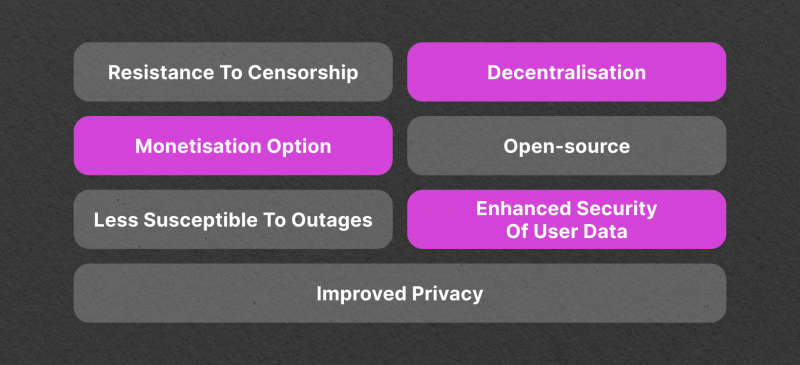
Benefits
Decentralized social media platforms are gaining greater popularity, and for good reason. Here are some of the numerous advantages DeSo venues can deliver to their users.
Resistance to Censorship
A blockchain social network offers a platform for free speech, ensuring users are not arbitrarily banned, de-platformed, or restricted, and only the original poster can remove a post once shared.
Decentralisation
A social network on blockchain eliminates intermediaries facilitating peer-to-peer transactions, thus granting content creators direct ownership and enabling direct engagement with followers and fans. This direct interaction eliminates the need for centralized platforms, allowing users to interact directly without relying on intermediaries.
Monetisation Option
DeSo systems, incorporating NFTs and crypto payments, provide a monetisation framework for content creators, allowing them to receive payments directly from audiences without relying on centralised platforms for advertising revenue.
Open-source
Blockchain-based social websites, driven by open-source ideals, enable public scrutiny of applications’ source codes, eliminating opaque algorithms used in traditional social media, thereby enhancing alignment between users and platform creators.
Less Susceptible to Outages
ETH-based dApps, supported by a global, peer-to-peer node network, are less susceptible to server downtime and outages than traditional dApps, primarily based on a single network of nodes.
Enhanced Security of User Data
The blockchain technology used for DeSo venues offers more secure storage and distributed nature compared to traditional platforms, making it harder for hackers to tamper with user data.
Improved Privacy
DeSo venues provide users with high privacy and anonymity, allowing them to sign in to Ethereum-based networks without sharing personal information. Blockchain’s transparency allows users to trace transactions and verify their authenticity, making it crucial in the face of misinformation and fake news on social media.
Drawbacks
Despite their revolutionary nature, decentralized social networks also have unique limitations and growth complications. Let’s discuss them in more detail.
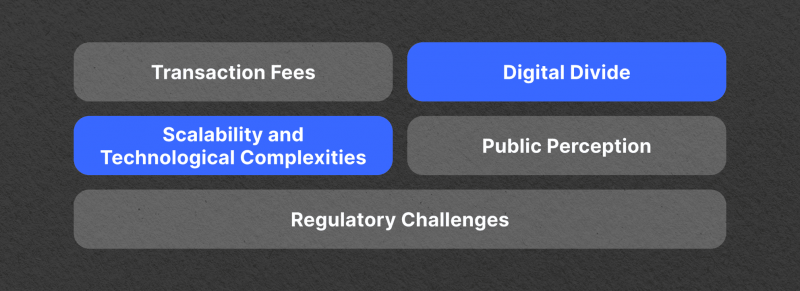
Transaction Fees
Ethereum network operations, except data reading, require token-based transaction fees, which fluctuate based on network congestion, potentially deterring potential users.
Digital Divide
Global population segments lacking consistent internet access and modern technological devices may exacerbate the digital divide.
Scalability and Technological Complexities
Scalability issues are prevalent on blockchain platforms, particularly Ethereum-based DeSo networks. As user numbers increase, operations speed can decrease. Blockchain’s decentralized nature necessitates consensus among nodes, causing scalability issues.
Additionally, interoperability issues may arise with non-blockchain platforms. The complex user interface and slow transaction speed may also hinder user adoption.
Public Perception
Social media websites rely on network effects, making it challenging for new distributed ledger platforms to gain a critical mass of users. Additionally, users may not understand the benefits of blockchain or how to use it.
Established platforms have brand recognition and trust, which new blockchain-based platforms may struggle to achieve. Furthermore, the legal standing of crypto social networks may face future challenges due to global cryptocurrency regulations.
Regulatory Challenges
The absence of a clear legal framework for blockchain-based social media platforms raises uncertainties. Compliance with existing regulations like data privacy and anti-money laundering may be required. Additionally, censorship resistance may arise due to the potential for illegal or harmful content. With global governments discussing cryptocurrency regulations, DeSo networks may face future challenges.
Top 5 Most Popular Decentralised Social Networks
Decentralized social media networks are revolutionizing online communication by enhancing transparency, data ownership, and decentralized incentives. Here are some examples of the most favored DeSo platforms.
1. Sapien
Sapien is a blockchain-based social news network that aims to create a transparent, democratic ecosystem by allowing users to earn rewards for their contributions and implementing a decentralized governance model for decision-making. Users can create customized news feeds and engage in meaningful conversations with others who share their interests.
2. Minds
Minds, an “anti-Facebook” platform, shares similarities with Facebook but is open-source in its code and algorithms. It has a transparent content moderation and spam policy. Users can earn the platform’s native token, $MINDS, for quality content creation and code contributions. Minds prioritizes user privacy and free speech, offering rewards for contributions and data security.
Minds offers features like news feeds, groups, and direct messaging but also provides decentralized technology and censorship resistance, allowing users to express themselves freely. It’s an excellent choice for those seeking a platform that promotes free speech and user engagement.
3. Steemit
Steemit is a decentralized social media network based on the Steem blockchain, where users are paid to survey and create content. Steemit’s strategy alters the conventional media model by fostering a thriving ecosystem of content producers and directly paying them.
With Steemit, users can publish, upvote, and comment on content, earning cryptocurrency rewards through the platform’s native token, Steem. Steemit’s content monetization strategy encourages users to create high-quality content, earning rewards based on popularity and engagement. Its dedicated network hosting ensures high scalability and avoids congestion issues.
This platform fosters a dynamic community of creators and consumers, making it an ideal choice for those interested in blogging or long-form content.
4. Mirror
Mirror is a blockchain-based writing platform that uses Web3 principles for decentralization and user ownership. It allows users to read and write for free by connecting wallets and allows writers to mint their posts into NFTs, preserving their work indefinitely on the blockchain. Posts are stored on Arweave, a decentralized storage platform, and can be converted into Writing NFTs.
Writing NFTs are completely free for writers to create, and collection happens on an Ethereum L2, making transactions inexpensive, fast, and environmentally friendly.
Mirror empowers writers to monetize their work through crypto subscription payments and facilitates the formation of decentralized autonomous organizations.
5. Mastodon
Mastodon, the world’s largest free, open-source, decentralized microblogging network, offers a unique social media experience that prioritizes user control and decentralization. It allows users to share text, GIFs, images, and videos and join servers based on specific topics.
The platform operates as interoperable code across multiple websites, allowing developers to create and manage their own servers, known as “instances.” These instances are owned, operated, and moderated by creators, often funded by the community.
Mastodon was founded in 2016, and it is now the world’s largest open-source microblogging platform, with over three million users.
Fast Fact:
Steemit, launched in 2016, is perhaps the oldest blockchain-based social media platform still in operation.
Blockchain And Traditional Social Media Platforms Integrations
Web3 social media platforms are not the only ones integrating blockchain technology into their frameworks. Here are some major Web2 platforms that use blockchain in social media to integrate Web3 features and enhance user experience.
Reddit is introducing Community Points, ERC-20 tokens that users can earn by posting quality content and contributing to online communities. These tokens can be redeemed for exclusive privileges and perks within a subreddit. These tokens, like “Moons” on the r/CryptoCurrency subreddit, exist independently of Reddit and cannot be revoked.
To enhance efficiency and scalability, Reddit is collaborating with Arbitrum, a layer 2 rollup solution. Users can use Community Points to unlock special features and trade them for fiat on exchanges. The amount of Community Points users own determines their influence on community decision-making.
Instagram has introduced support for Ethereum- and Polygon-based NFTs, allowing users to post them directly on their profiles by connecting their ETH wallets. This allows users to showcase and share their digital collectibles with their followers, enhancing their digital presence on the platform.
The Future of Blockchain Social Media Platforms
Decentralized social networks are based on the belief in a more democratic and accessible internet, offering a promising solution to issues like privacy violations, censorship, and data monopolies. These networks prioritize user control and privacy, fostering a sense of community beyond basic socializing and connectivity.
Social media on blockchain catalyze a socio-economic transformation as decentralization becomes more important in society. In the future, decentralized public networks may become the new norm, allowing people to freely express ideas, own digital assets, and earn income from their content. They may also integrate new technologies like Virtual Reality and Augmented Reality to create a more immersive user experience.
A blockchain social media platform offers enhanced privacy and security through blockchain technology and encryption, providing a more open space for communication. Such platforms also promote service interoperability and use decentralized identities, allowing users to have a single, self-sovereign identity across miscellaneous platforms. As blockchain and social media continue to evolve, they have the potential to revolutionize online communication.
Closing Thoughts
By incorporating blockchain technology, social media can become more secure, transparent, and private, ultimately authorizing users to have more autonomy over their data. DeSo platforms enable communities to flourish and express their creativity through shared control. The new choices prioritize privacy, ownership of data, and resistance against censorship. They aim to create a more equitable and user-friendly internet.
As we navigate the digital age, decentralized social networks will become increasingly important, representing a forward-thinking approach to digital communication. The future of social networking lies in blockchain-based platforms where users are at the forefront of their digital experience.
FAQ
How do decentralized social media make money?
Such social media sites are advertising-free and do not generate revenue from selling user data. They generate revenue through a successful crypto economy and user adoption.
Is it possible to build a social media app on the blockchain?
Developers can create secure, transparent, and user-centric social media by utilizing blockchain technology, smart contracts, and decentralized data storage solutions.
What are the benefits of using a decentralized social media platform?
Crypto social media platforms deliver improved protection, privacy, and regulation of users’ data compared to centralized platforms.
What are some of the most popular DeSo media platforms?
Decentralized social media websites such as Mastodon, Minds, and Steemit are widely used and popular among users.
